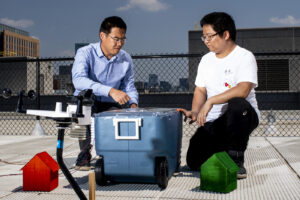Northeastern University, renowned for its groundbreaking research and entrepreneurial spirit, has become a thriving ecosystem for innovation and startup development. Among the exceptional ventures emerging from this community is Planck Energies, founded by Yi Zheng, Planck Energies President, and Northeastern professor. Planck Energies is a clean-energy startup that exemplifies the intersection of academic excellence and entrepreneurship in the field of carbon-neutral technology and products. With a vision to combat climate change, reduce greenhouse gas emissions, and alleviate global water scarcity, Planck Energies is at the forefront of developing cutting-edge renewable energy solutions for commercial and residential environments globally.
What sets Planck Energies apart is its relentless pursuit of knowledge and integration of the latest advancements in its sustainable products. By actively engaging with academic and industry research, including nanotechnology, nature-derived materials, and smart optical components, the startup creates innovative and environmentally conscious solutions. By engineering products that reduce energy consumption, operational costs, and ecological impact, Planck Energies maximizes value for its customers while promoting a greener future.

Photo by Ruby Wallau/Northeastern University
Dr. Zheng took some time with CRI to discuss the journey of Planck Energies.
Q: Could you share your personal journey as founder of Planck Energies? What inspired you to embark on this entrepreneurial endeavor and contribute to the sustainable energy landscape?
As an engineering professor, I have studied sustainable materials to harvest renewable energy for years, fundamentally and practically. So, when I see a problem in the real world, I look for its solution from a scientist’s stand of point as well as an engineer’s. The most challenging engineering obstacle is to apply a cool idea that has been validated in lab into practice, ultimately to benefit a wide community. Our Nano Energy Laboratory at Northeastern University has explored various types of materials for solar thermophotovoltaics, passive cooling, and water treatment, and published peer-reviewed journal papers. Some concepts are innovative, but probably only on paper, while some have great potential to yield cost-effective and functional products to combat global warming. That is my motivation of founding a clean-technology startup Planck Energies.
Q: What are the key aspirations of Planck Energies in terms of impact and reach within the realm of sustainable energy solutions for both commercial and residential environments?
We are very excited about our work on cool roof technology. This has the potential to reduce A/C electricity costs and carbon emissions greatly, which will have a significant global impact. Cooling systems are one of the largest contributors to electricity use and reducing this need via passive technologies represents an important step towards sustainability.
On top of this, we’re very eager to apply this technology to less industrialized communities. In many areas where A/C is not viable due to monetary, developmental, or other factors, the lack of reliable cooling technology represents a great risk to human well-being. With heat waves on the rise, finding a more viable cooling approach for these regions is of paramount importance. Cool roof technology is extremely well suited to these scenarios due to its low cost and off-grid capability, so we are very driven to apply it in these environments.
Q: As a startup that emerged from Northeastern, what were the pivotal factors that led to the establishment of Planck Energies as an independent entity, distinct from its academic origins?
As a researcher, I endlessly look for innovative solutions to solve global energy problems, regardless of cost and labor. That is the nature of conducting fundamental research, however, material, lab and manufacturing costs are essential in industry. In addition, we need to understand better the demand on the market through interviews with end users and potential customers, in order to improve the design and manufacturing strategies for lower cost and perfect functionality. These cannot be achieved in an academic lab, but an independent startup. Don’t be scared. We are “partially” prepared because I believe running a research lab as an independent principal investigator is quite like running a business. You will feel that way yourself.
Q: How has the support from Northeastern University’s CRI contributed to the growth and success of Planck Energies?
The CRI’s support is vital to the growth of Planck Energies. Through CRI, firstly, filed patents and executed licensing agreement secure the protection of our intellectual property, for example, the fabrication and use of nanofibrous material for passive cooling; Secondly, seed fund support like CRI’s Spark Fund is extremely helpful particularly for startups at their early stages; Thirdly, the free-of-charge entrepreneurship training program and mentoring network equip the faculty entrepreneurs like me with the necessary knowledge in marketing analysis, business development and management.
Q: During your startup journey, what are some of the unique challenges you have encountered and how did you overcome them to achieve success in the sustainable energy industry?
I would say time management, that might not be a unique challenge in general. As a full-time employee, I mentor Ph.D. and master’s students, teach undergraduate and graduate level courses, write research grant proposals and papers, and organize outreach activities with K-12 students. As a startup founder, I am responsible not only for the business development, but also the employees including chief officers and summer interns. Another big challenge is to seek financial support for your own startup. Similar to writing a research proposal to the National Science Foundation or Department of Energy, there are funding opportunities offered at federal and state levels. To be qualified to request those, you need to learn the new requirements such as different proposal formats and business plan in detail. Attending some startup training programs on and off campus is necessary and helps us achieve success in business development.

Photo by Ruby Wallau/Northeastern University
Q: For researchers and principal investigators within Northeastern, who are eager to explore the realms of entrepreneurship, what collaborative opportunities does Planck Energies present? How can they actively engage and contribute to advancing the field of renewable energy solutions?
Planck Energies are collaborating with the National Renewable Energy Lab and our industrial partners such as 3M and Henkel on the durability test and the integration of our cooling products with buildings. Also, Planck Energies seeks research collaboration with Northeastern’s faculty with expertise in chemical synthesis, materials characterization, manufacturing, energy system management, and emerging market analysis. I expect to further reduce the cost and advance the surface features of our passive cooling products including self-cleaning and fire-proof properties to extend their lifespan and versatility.
Q: What advice would you give to aspiring entrepreneurs who are looking to start their own venture? How can they navigate the challenges and seize opportunities in this evolving landscape?
Starting up a business sounds fun, and it really is, but time consuming. I would advise you to have a tenured position secured prior to starting your own venture. Be prepared for a completely new world ahead, which is far different from academia. Other than doing research in labs, as a founder, you need to learn the market and industry deeply, get yourself familiar with business terms, and network socially with mentors, industrial advisors, investors, business funding program managers, etc. One most important thing you would face is to well manage your time, as you have to teach, research, supervise students, and run a business at the same time. When to start a venture? Nobody understands your technology better than you. If you have a vision, please consult the CRI for advice and support.
Q: Are there any achievements or notable milestones achieved by Planck Energies that you would like to highlight or any information that we may have missed?
Our startup has recently onboarded our first full-time engineer, which is providing fantastic support to our R&D goals. We are also pursuing several funding opportunities through federal agencies such as the NSF and Air Force, as well as local opportunities through Northeastern and MassCEC. We have also been invited to participate in Massachusetts Innovation Network’s Strategic Pitch Night later this summer, allowing us a great networking opportunity with established industry leaders.
Planck Energies stands as an inspirational testament to the boundless entrepreneurial potential within Northeastern University’s esteemed faculty community. By showcasing the transformative power of entrepreneurship and innovation, the startup kindles a collective fire among researchers and professors, bridging the chasm between academic research and tangible real-world impact. As Northeastern champions the spirit of entrepreneurship it can pave the way toward an era of unbridled innovation, where faculty becomes vanguards of transformative solutions, propelling us toward a sustainable and prosperous future.
Written by Yash Wadhwa
